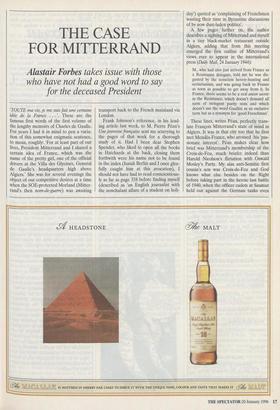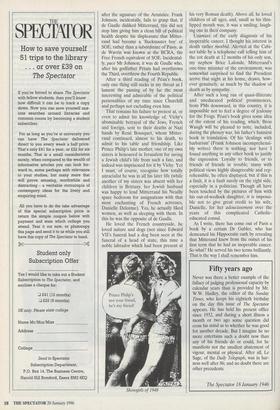THE CASE FOR MITTERRAND
Alastair Forbes takes issue with those
who have not had a good word to say for the deceased President
`TOUTE ma vie, je me suis fait une certain idee de la France . . . '. These are the famous first words of the first volume of the lengthy memoirs of Charles de Gaulle. For years I had it in mind to pen a varia- tion of this somewhat enigmatic sentence, to mean, roughly: 'For at least part of our lives, President Mitterrand and I shared a certain idea of France, which was the name of the pretty girl, one of the official drivers at the Villa des Glycines, General de Gaulle's headquarters high above Algiers.' She was for several evenings the object of our competitive desires at a time when the SOE-protected Morland (Mitter- rand's then nom-de-guerre) was awaiting transport back to the French mainland via London.
Frank Johnson's reference, in his lead- ing article last week, to M. Pierre Pean's Une jeunesse francaise sent me scurrying to the pages of that work for a thorough study of it. Had I been dear Stephen Spender, who liked to open all the books in Hatchards at the back, closing them forthwith were his name not to be found in the index (Isaiah Berlin and I once glee- fully caught him at this avocation), I should not have had to read conscientious- ly as far as page 358 before finding myself (described as 'an English journalist with the nonchalant allure of a student on holi- day') quoted as 'complaining of Frenchmen wasting their time in Byzantine discussions of by now dust-laden politics'.
A few pages further on, the author describes a sighting of Mitterrand and myself in a tiny black-market restaurant outside Algiers, adding that from this meeting emerged the first outline of Mitterrand's views ever to appear in the international press (Daily Mail, 24 January 1944):
M., who had also just arrived from France as a Resistance delegate, told me he was dis- gusted by the senseless heresy-hunting and sectarianism, and was going back to France as soon as possible to get away from it. In France, there seems to be a real union sacrie in the Resistance, which doesn't demand all sorts of stringent purity tests and which doesn't use the word Gaullist as an exclusive term but as a synonym for 'good Frenchman'.
These lines, writes Pean, perfectly trans- late Francois Mitterrand's state of mind in Algiers. It was in that city too that he first met Mendes-France, who aroused his 'pas- sionate interest'. Nan makes clear how brief was Mitterrand's membership of the Croix-de-Feu, much briefer indeed than Harold Nicolson's flirtation with Oswald Mosley's Party. My alas anti-Semitic first cousin's son was Croix-de-Feu and God knows what else besides on the Right before taking part in the heroic last battle of 1940, when the officer cadets at Saumur held out against the German tanks even after the signature of the Armistice. Frank Johnson, incidentally, fails to grasp that, if de Gaulle disliked Mitterrand, this did not stop him giving him a clean bill of political health despite his displeasure that Mitter- rand had become a `Buckmaster boy' of SOE, rather than a subordinate of Passy, as de Wavrin was known at the BCRA, the Free French equivalent of SOE. Incidental- ly, pace Mr Johnson, it was de Gaulle who, after his godfather Petain had overthrown the Third, overthrew the Fourth Republic.
After a third reading of Pean's book, only one thing still sticks in my throat as I lament the passing of by far the most interesting and admirable of the political personalities of my time since Churchill and perhaps not excluding even him.
That remains his failure to protest at, or even to admit his knowledge of, Vichy's abominable betrayal of the Jews, French and foreign, sent to their deaths at Nazi hands by Rene Bousquet, whom Mitter- rand continued, almost to his death, to admit to his table and friendship. Like Prince Philip's late mother, one of my own sisters is honoured in Jerusalem for saving a Jewish child's life from such a fate, and indeed was imprisoned for it by Vichy. Yet I must, of course, recognise how totally unracialist he was in all his later life (while another of my sisters was absent with her children in Brittany, her Jewish husband was happy to lend Mitterrand his Neuilly spare bedroom for assignations with that most enchanting of French actresses, Danielle Delorme). Yes, he actually liked women, as well as sleeping with them. In this he was the opposite of de Gaulle.
He loved the French countryside, he loved nature and dogs (not since Edward VII's funeral had a dog been seen at the funeral of a head of state, this time a noble labrador which had been present at Showgirls of 1948 his very Roman death). Above all, he loved children of all ages, and, small as his thin- lipped mouth was, it was a smiling, laugh- ing one in their company.
Unaware of the early diagnosis of his inoperable cancer, I thought his interest in death rather morbid. Alerted at the Cabi- net table by a telephone call telling him of the cot death at 12 months of his only son, my nephew Brice Lalonde, Mitterrand's one-time minister of the environment, was somewhat surprised to find the President arrive that night at his home, drawn, how- ever genuinely, as much by the shadow of death as by sympathy.
After such a long run of quasi-illiterate and uneducated political prominences, from PMs downward, in this country, it is impossible not to feel a degree of jealousy for the Frogs. Pean's book gives some idea of the extent of his reading, which, Bron Waugh will be pleased to note, included, during the phoney war, his father's funniest book in translation. Of his 'dealings with barbarism' (Frank Johnson incomprehensi- bly writes) there is nothing, nor have I found anything in any other book to justify the expression. Loyalty to friends, or to friends of friends in trouble, many with political views highly disagreeable and rep- rehensible, he often displayed, but if this is a fault, it is a fault surely on the right side, especially in a politician. Though all have been touched by the pictures of him with his out-of-wedlock daughter, it is impossi- ble not to give great credit to his wife, Danielle, for her adoucissement over the years of this complicated Catholic- educated consul.
As I write, there has come out of Paris a book by a certain Dr Gubler, who has demeaned his Hippocratic oath by revealing that Mitterand knew from the outset of his first term that he had an inoperable cancer. So what? He served his two terms brilliantly. That is the way I shall remember him.



























































 Previous page
Previous page